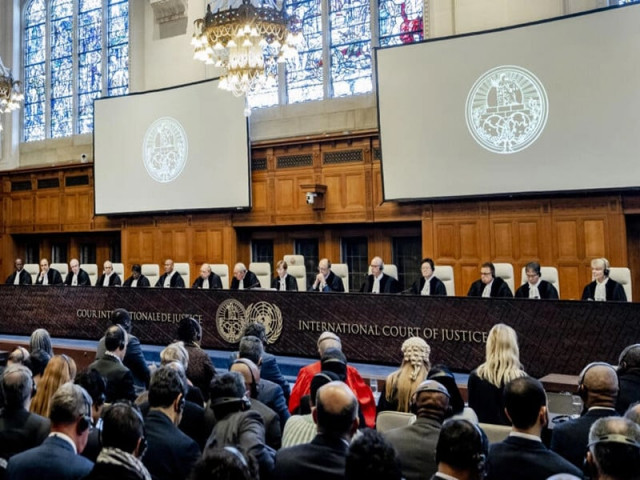Israel suffers major blow at The Hague
ICJ rules occupation of Palestinian territories illegal

The UN’s top court said in a sweeping opinion on Friday that Israel’s decades-long occupation of Palestinian territory was “illegal” and needed to end as soon as possible.
The advisory opinion by The Hague-based International Court of Justice was immediately slammed as a “decision of lies” by Israel, but welcomed by the Palestinian presidency which called it “historic”.
The ICJ’s statement, called an “advisory opinion”, is not binding, but it comes amid mounting concern over the death toll and destruction in Israel’s war against Hamas sparked by the group’s brutal October 7 attacks.
It is also likely to increase diplomatic pressure on Israel, whose lawmakers voted Thursday to oppose a Palestinian state, calling it an “existential threat.”
In The Hague, ICJ presiding judge Nawaf Salam said: “The court has found that Israel’s continued presence in the Palestinian Territories is illegal.”
Israel is “under the obligation to bring to an end its unlawful presence as rapidly as possible,” the judge said at the Peace Palace, seat of the ICJ.
The ICJ added that Israel was “under an obligation to cease immediately all new settlement activities and to evacuate all settlers” from occupied land.
Israel’s policies and practices, including the building of new settlements and Israel’s continued maintenance of a wall between the territories, “amount to annexation of large parts” of the occupied territory, the court said.
Israeli Prime Minister Benjamin Netanyahu slammed the ICJ’s opinion as a “decision of lies.”
“The Jewish people are not occupiers in their own land -- not in our eternal capital Jerusalem, nor in our ancestral heritage of Judea and Samaria” (the occupied West Bank), Netanyahu said in a statement.
Palestinian foreign minister Riyad Al-Maliki called it a “watershed moment.”
“The Palestinian people have endured unbearable suffering and injustice for decades,” Al-Maliki told reporters outside the courtroom.
A separate, high-profile case that South Africa has brought before the court alleges that Israel has committed genocidal acts during its Gaza offensive.
The UN’s General Assembly asked the ICJ in late 2022 to give an “advisory opinion” on the “legal consequences arising from the policies and practices of Israel in the Occupied Palestinian Territory, including East Jerusalem”.
The ICJ held a week-long session in February to hear submissions from countries following the request -- supported by most countries within the Assembly.
During the hearings, most speakers called on Israel to end its 57-year occupation. They warned a prolonged occupation posed an “extreme danger” to stability in the Middle East and beyond.
But the United States said Israel should not be legally obliged to withdraw without taking its “very real security needs” into account.
Israel did not take part in the oral hearings.
Instead, it submitted a written contribution in which it described the questions the court had been asked as “prejudicial” and “tendentious”.
The General Assembly asked the ICJ to consider two questions.
Firstly, the court should examine the legal consequences of what the UN called “the ongoing violation by Israel of the right of the Palestinian people to self-determination”.
In its answer, the ICJ’s judges said Israel’s “unlawful policies and practices are in breach” of its “obligation to respect the rights of the Palestinian people.
In June 1967, Israel crushed some of its Arab neighbours in a six-day war, seizing the West Bank and East Jerusalem from Jordan, the Golan Heights from Syria, and the Gaza Strip and Sinai Peninsula from Egypt.
Israel then began to settle the 70,000 square kilometres (27,000 square miles) of seized Arab territory.



















COMMENTS
Comments are moderated and generally will be posted if they are on-topic and not abusive.
For more information, please see our Comments FAQ